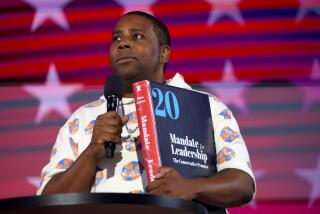Democratic Platform Seeks to Keep Old Alliances While Moving Toward Center
- Share via
WASHINGTON — The Democratic platform committee Saturday gave its approval to a 1992 policy manifesto intended to give the party a more centrist image while preserving the allegiance of its traditional constituencies.
The committee, controlled by partisans of presumptive presidential nominee Bill Clinton, also took a step toward promoting unity with one of his primary rivals, former Massachusetts Sen. Paul E. Tsongas. While rejecting four economic proposals pushed by Tsongas, the Clinton forces agreed to let the measures come up for debate at next month’s Democratic national convention in New York.
The Clinton forces took a less conciliatory approach to an effort by another of his primary foes--former California Gov. Edmund G. (Jerry) Brown Jr.--to alter the platform. Not only were a series of Brown amendments rebuffed, but he failed to win sufficient support for having them aired at the convention.
From preamble to conclusion, the platform approved Saturday for adoption at the convention bears the stamp of Clinton, whose candidacy is aimed at moderating the party’s tradition of government activism yet who managed to forge coalitions with liberal forces in capturing a majority of convention delegates.
“We are a changed party,” National Democratic Chairman Ronald H. Brown declared. “We are focused on economic growth, as opposed to (redistribution of income) rhetoric.”
To back his point, Brown cited the platform’s stress on encouraging investment through measures such as a targeted capital gains tax cut and on reducing the burden of government on taxpayers by limiting spending increases and trimming bureaucratic fat.
But the platform also struck many traditional Democratic notes, notably in its support of racial equality and abortion rights, as well as its pledge to invest “significant resources” to spur job creation in urban areas.
Also in keeping with the party’s past was the sweeping diversity of the platform debate. For more than eight hours, committee members dealt with nearly 100 proposed amendments ranging from the Middle East to animal rights and a recommendation that the cannabis hemp plant--the source of marijuana--be recognized as “a tool of relaxation and creative inspiration.” The latter proposal failed to win a second.
But a sharp contrast to many such sessions in the party’s fractious past was the relative harmony with which the hearing proceeded, an atmosphere fostered by the deal cut between the Clinton and Tsongas camps.
Concluding negotiations the two men initiated themselves earlier in the week, Clinton’s supporters gave Tsongas the delegate support he will need to get a hearing on the convention floor for his four amendments to the platform’s economic policy section.
Clinton “wanted to show respect for Paul’s positions,” said Massachusetts state party chairman Steve Grossman. “And he wants Paul to be an enthusiastic supporter of his candidacy.”
The move forestalled the possibility of Tsongas delegates joining forces with delegates for Edmund G. (Jerry) Brown Jr. to ensure that each of their proposed platform amendments would go to the convention floor as minority plans.
The Tsongas measures call for a cap on federal spending, a more extensive capital gains tax cut than proposed in the platform, a 5-cent-a-year increase in the gas tax that would be sued to pay for infrastructure improvements and postponement of the family tax relief plan supported by Clinton.
Although Clinton is expected to direct his delegates not to support these measures on the convention floor, the fact that he was more willing to give a hearing to Tsongas’ relatively conservative economic ideas than to Brown’s more liberal proposals reflected the changing Democratic ideological outlook.
Brown, for his part, on Saturday offered 22 amendments that he said were intended “to give our party the edge it needs to authentically represent our proud traditions.”
Bearing out his candidacy’s anti-Establishment tone, Brown’s amendments included what he termed “a humility agenda” that included proposals to roll back congressional pay raises and set 12-year term limits for federal officeholders.
In a gesture toward Brown, the Clinton forces agreed to accept a stripped down version of his environmental plank that includes a call for creating a Civilian Conservation Corps and phasing out use of hazardous chemicals. Brown’s backers rejected the compromise, arguing it did not go far enough, but it was approved anyway.
More to Read
Get the L.A. Times Politics newsletter
Deeply reported insights into legislation, politics and policy from Sacramento, Washington and beyond. In your inbox twice per week.
You may occasionally receive promotional content from the Los Angeles Times.










